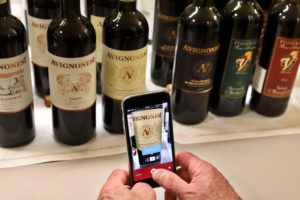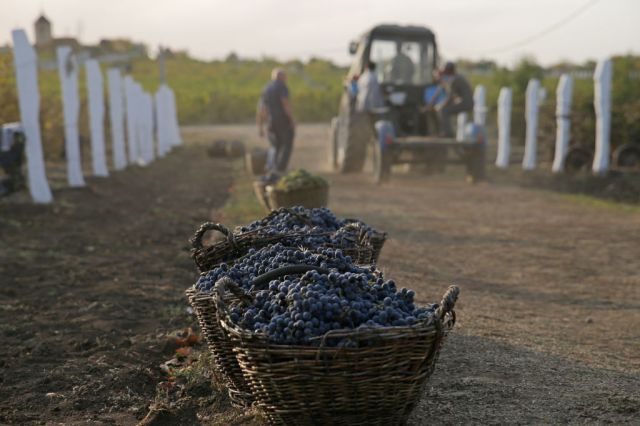Credit: Alexander RekaTASS via Getty Images

It is one of the required talents of the professional wine taster that he or she can intuit how a young wine will develop in ten or 15 years time. They have a palate that can project into the future, figuring out how a wine will open out, how its tannins might soften, how its fruit may come through. Perhaps this is why debates in the wine world, dating back at least to the release of the film Mondovino in 2004, and even long before that, prefigured the concerns many of us now share about globalisation.
In the world of fine wine, the focus of these arguments often circle around the influence of the mega-star wine critic Robert Parker Jr., a man who has more influence on the taste and price of wine than anyone else has, or ever had had. Now in his seventies, Parker is retired. But back in 1975, the former lawyer, taking his lead from former presidential candidate, Ralph Nader — a consumer rights advocate — began to publish The Wine Advocate, a kind of consumer guide to fancy wine.
The world of wine had never seen anything like it. Parker was on a mission to demythologise all the snobby and obscure terminology under which fine wine was clouded and developed a simple 100 point scale on which wines could be judged.
As his influence grew, a Parker wine score in the 90s would pretty much guarantee considerable financial success to a vineyard. Inevitably, so the argument goes, those who made wine started to adjust the taste of their product so that it would suit the arbiter’s palate.
Parker generally likes big, dark, gutsy, jammy, tannic wines that can, his critics say, be engineered to taste that way in post-production, often by use of imported yeasts or through the use of young oak barrels. It’s more about clever chemistry than the particular charisma of the local terroir. Parker’s taste favours the muscular Californian Cabernet wines and the great Château wines of Bordeaux, yet has little appreciation for the lighter, less tannic, more subtle Pinot Noirs from Burgundy or Gamays from the Loire Valley. “Bad critics look at Pinot through Cabernet-tinted spectacles and so criticise it for being something it never set out to be,” writes Clive Coates, in a not so subtle dig at Parker, in his encyclopaedic The Wines of Burgundy.
Those who bewail Parker’s phenomenal influence speak of “parkerisation” as the wine equivalent of globalisation. The New York Times wine critic Alice Feiring writes that this is how “Rioja loses its Spanish accent”: parkerisation leads to an increasingly homogenised style of wine in which the diversity of grapes and wine tastes come to be submerged under the over powerful influence of Parker’s very particular palate. Those, like her, who prefer subtlety in their wine speak dismissively of Parker’s love for “jam bombs”.
Those who defend Parker, argue that his 100 point scale works as a kind of bullshit detector. It’s cutting through all the fancy talk and obscure (often) French classifications, to focus on the taste and the taste alone.
Parker famously refuses the kind of overly generous hospitality that can influence some wine critics. He pays his own way, and takes as he finds. Reputation does not matter to him. His Nader-like political philosophy is simply to deliver value for the consumer – and he is not going to be suckered by pretentious Europeans making overly expensive wine that doesn’t actually taste all that great. It’s a noble democratic mission with an ever so slightly Puritanical, characteristically American disdain for class, high culture and over-intellectualism.
This same democratic spirit is taken to a whole new level with the advent of social media. I have the Vivino app on my phone. It enables me to take a photo of a wine label in a shop and to receive an instant crowd funded score – out of 5 — as to the wine’s aesthetic value. With a database of over 10 million wines, and now 35 million or so users, Vivino is the ultimate in wine de-mystification.

Labels are confusing. In Burgundy especially, the mind bogglingly complex classification system, built around thousands of small farms, makes Hegelian philosophy look like child’s play. But with this handy myth buster, I can reduce hundreds of years of wine growing history to a simple number. Today, my Vivino app suggests that I might like a Gran Corte (VIII) 2013 from Argentina. It gives the wine a very high 4.5 score and describes it as “a fantastic ‘Bordeaux’ from South America”. That bothers me. I want my Bordeaux to come from and to taste of, well, Bordeaux. Vivino was first developed in Denmark by techie people who freely admit they know nothing about wine. The photographs we take of the wine are uploaded onto their database by office workers in India. The headquarters of the company is now in California, where else.
Last month, the influential Decanter magazine placed Parker in their Hall of Fame. I imagine there will be readers spluttering into their glasses of Romanée-Conti all the way from Beaune to Berry Brothers. Some of this will come from a certain snobbishness, a dislike of brash American straight-talking. For others, Parker is resisted out of a desire to retain some sort of mystique for wine and not reduce the whole wine experience simply to one of mere flavour. As Andrew Jefford writes in the same issue of Decanter, some people “taste morally” – seeking authenticity. As a Loire wine grower and one of the leaders of the biodynamic wine movement, Nicholas Joly once commented: “Avant d’etre bon, un vin doit etre vrai” (before being good, a wine must be true). I have some sympathy with all of this view myself.
The crunch issue between wine globalists and, lets call them, wine communitarians, is probably what one makes of the French term “terroir”. Beloved of communitarian conservatives such as Roger Scruton, terroir is the name for the way in which the local environment, micro-climate, soil composition, historic farming practices, and so on come to shape the way a wine is made. It is as much a spiritual idea as an environmental one.
The political import of terroir is that every wine is a somewhere, an expression of place. Part of the reason why descriptions of French wine can be so dizzyingly complicated – especially in Burgundy – is that local appellations often develop their own systems of classification. It is against all this local arcane and highly fragmented complexity that the globalist stands with their universal system of standardised aesthetic judgment. For some, then, terroir is little more than “vinecultural voodoo” with no basis in science. For others, it is more a question of wines having a soul, and that they receive their soul from a place, and loose it when they are heavily manipulated in post-production.
Parker’s taste buds were famously insured for a million dollars. For him, it was all about the taste – a highly subjective experience that required most of all absolute honesty, a refusal to be swayed by extraneous concerns, and a laser like focus on the sheer aesthetic experience of the taste itself and nothing else. In a way, his philosophy was a highly educated way of saying “I know what I like”.
But with the influence of the market, and now through information technology, it has become obvious that subjectivity can be schooled. We learn to like certain things. Those who grow up drinking Coca Cola have taste buds schooled to appreciate sweet and fizzy things, whereas those in, say, tea drinking cultures will generally appreciate more bitterness, like tannins in red wine. The problem with “I know what I like” is that what we like is partially learned, and is thus more changeable, and so more subject to manipulation, that we might assume. In other words, simple honesty about saying what one tastes is no prophylactic against the threat of a homogenised, global style.
In Mondovino, the issue of globalisation is seen as one of American capitalism versus the plucky French farmer. It is obviously more complicated than that. Parkerisation has inspired a whole new audience to love and appreciate the pleasures of the grape. And his scoring system has enabled a number of small boutique vineyards to compete commercially with their larger and more established competitors. To this extent, Parkerisation is not all about American capitalism flattening the little guy.
That said, the problem is not so much with Parker himself, but rather how the wine industry too often plays to his scoring system. And that creates the threat of all wine tasting more and more the same – a little too macho, too in your face, too brash. As Alice Feiring writes, what she really wishes she could say to Parker is this: “Please do not contribute to the dumbing down of the wine world. And if my Loire Valley Cabernet or Cot or Pineau d’Aunis or Gamay start tasting like Barossa Valley Shirazes, I’ll have to switch over to Calvados.” And I will be joining her.










Join the discussion
Join like minded readers that support our journalism by becoming a paid subscriber
To join the discussion in the comments, become a paid subscriber.
Join like minded readers that support our journalism, read unlimited articles and enjoy other subscriber-only benefits.
Subscribe